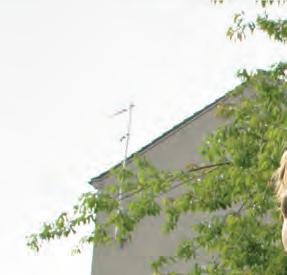
11 minute read
Update
from Lead autumn 2022
by Educate21
Vote now to give teachers the pay rise they deserve
VOTING in the union’s ballot of members across England and Wales is now underway, which could result in the rst strikes in education Kevin Courtney for a generation from January. Leaders are among 300,000 teachers and support sta being asked if they would be prepared to take strike action if the Mary Bousted Government fails to give teachers a fully funded, above-in ation pay rise.
Advertisement
In the summer, the Government announced a ve per cent pay rise, which at a time of soaring in ation amounts to a seven per cent pay cut. On the back of years of below-in ation pay rises, teachers have now had a 20 per cent pay cut since 2010.
Support sta have had a 27 per cent cut over the same period.
Many are being pushed into poverty. ey are being forced to take second jobs to pay the bills, rely on food banks to feed their families and nancial help from friends and family.
Teachers are leaving in droves, deepening the recruitment and retention crisis and leaving leaders struggling to ll posts. Support sta are leaving education for better-paid jobs in the retail, hospitality and or care sectors.
Announcing the formal ballot, NEU joint general secretaries Mary Bousted and Kevin Courtney said: “ e strength of feeling should not be underestimated. Teachers work among the longest hours of any profession, and according to the OECD, those “The strength working in England work longer hours of feeling than teachers anywhere else in should not be Europe. “Pay, along with underestimated.” workload, lies at the root of a recruitment and retention crisis which should be of deep concern to the Government, but about which they have been completely ine ective.” ey added that the DfE’s own gures show one in eight teachers leave within their rst year, a quarter within three years of qualifying and almost a third are gone within ve years. e DfE routinely misses its own trainee targets. A preliminary ballot carried out between September and October returned an 86 per cent Yes vote. e NEU’s formal, postal ballot began on 31 October and will run until 13 January. Sister unions NAHT and NASUWT are also formally balloting members. A survey by NAHT found 64 per cent wanted to be balloted on strike action. Mary and Kevin said: “ e Government’s refusal to fully fund the meagre pay rise for 2022/23 is the nal insult. We repeat our willingness to meet with Government to nd a serious answer to more than a decade of declining pay.”

About the ballot
THE union has issued members with a formal postal ballot asking you to vote YES in favour of strike action to win a fully funded, above-infl ation pay rise. • The envelope is marked YOUR
NEU BALLOT PAPER ENCLOSED. • If your ballot paper doesn’t arrive, email ballotenquiries@ neu.org.uk as soon as possible. • Please vote as soon as you receive the ballot paper, as postal delivery may be slow due to strikes by CWU. • Our sister unions the NASUWT and NAHT are also balloting their members. • We are urging you to vote YES.
By law, a formal ballot for action needs to be postal. • At least 50 per cent of eligible members need to vote, with at least 40 per cent voting in favour of action.
PLEASE USE YOUR VOTE.
See feature page 10. Go to
neu.org.uk/pay/pay-campaign
Preventing sexism and harassment in schools
SCHOOL leader Kari Anson has become the first in the country to sign up to the union’s pledge to prevent sexism and sexual harassment at her school.
The union is calling on all schools to publicly make the pledge.
Kari attended a one-day conference in September to launch It’s not ok, a toolkit for implementing a whole- school approach to tackling sexism and harassment.
It includes posters, model policies, template letters, lesson plans and chatcasts with teachers who have done innovative work to address the issues.
The scale of the problem, which is experienced by staff and students in schools, has been a growing concern since the union and charity UK Feminista published a groundbreaking report in 2017 titled It’s just everywhere. It found 37 per cent of female students at mixed schools had been sexually harassed, and 78 per cent were not aware of any policies in their school to tackle sexism.
Last year, the Government asked Ofsted to carry out a rapid review, which concluded that sexism and sexual harassment has become “normalised” in schools.
The NEU has been at the forefront of the fight to end sexism and sexual harassment in schools and the It’s not ok toolkit offers practical advice on what members can do in their workplaces.
A panel that included Louise Regan, NEU executive member for equality and membership, Heather McKenzie, chair of the women’s organising forum, Charlotte Carson and Denise Henry, seat holder for Black members, discussed how to organise to prevent sexism and sexual harassment in schools.
Members also attended a range of workshops.
Go to neu.org.uk/end-sexism-sexual-
harassment

Kari Anson with the toolkit that helps schools tackle sexism and harassment
Mental health grants Black leaders training
GRANTS of £1,200 for mental health training are available from the Department for Education for schools and colleges.
Funding will help the school mental health lead measure need and monitor: • the impact of interventions; • understand the mental health needs of vulnerable groups of pupils such as those with a social worker and young carers; • put in place strategies to support staff and learners’ mental health; • strategies to develop positive relationships with parents, families and carers.
The grant can be spent on one of over 100 quality assured courses, delivered online or in-person, and beginner, intermediate or advanced levels. It can also be used to pay for supply cover to backfill the mental health lead while they are training.
Go to
onlinecollections.des. fasst.org.uk/fastform/ senior-mental-healthleads

See How I…page 16 A DEVELOPMENT programme for aspiring Black leaders, funded by the NEU, will start in January. Applications are now open. The sixth-month programme, Positioned for success, is designed to help tackle the persistently low number of Black leaders in education.
It is open to Black NEU members, based in a school or post-16 college, with at least three years’ experience who are looking to take the next step in their career. Tutors Marva Rollins and Dolapo Ogunbawo, both highly experienced school leaders, have been delivering bespoke training for Black teachers for 15 years.
Their new course, delivered in partnership with the NEU, covers a broad range of skills needed to move into or upwards in education leadership including submitting top class job applications and interviewing skills.
The application deadline is 9 December. Places are fully funded by the union, which will also cover reasonable travel expenses.
To book neu.org.uk/
black-leaders-course
See an interview with Marva Rollins and Dolapo Ogunbawo on page 12

NEU joint general secretary Mary Bousted with Conservative MP Flick Drummond at the launch in Parliament of the primary assessment commission’s report
Experts call for an end to statutory testing in primaries
TESTS in primary schools should be replaced with a system that prioritises children’s learning over league tables, a report published by an independent commission on primary assessment has recommended.
Reception baseline, phonics screening check, key stage 1 SATs and the multiplication tables check should be removed now and replaced by teacher assessment.
Year 6 SATs should be phased out.
Head teachers, teachers, and researchers are among the commissioners, who have based their findings on years of research, two new surveys of parents and educators, and their own expertise.
Most educators surveyed (93 per cent) and parents (82 per cent) were unsatisfied or very unsatisfied with the system of statutory assessment, while more than three-quarters of both teachers and parents agreed that there should be no government tests in primary schools.
Co-chair of the commission Professor Alice Bradbury, a former primary school teacher who is based at IOE, UCL’s Faculty of Education and Society, said the commission’s research showed the need to move away from high pressure tests that only tell teachers how a child performs on a specific day.
She added that implementing more flexible assessments by teachers would showcase a child’s successes and identify areas in which they need help.
At the report’s launch in Parliament, NEU joint general secretary Mary Bousted said: “Putting children through a Victorian curriculum in the 21st century is not productive. We took a wrong turn and we need to correct it. The time has come for us to look seriously at how assessment is dominating teaching and learning in primary schools.”
Report’s main recommendations
• Year 6 SATs should be phased out.
The other high stakes assessments (Reception baseline, phonics screening check, key stage 1 SATs and the multiplication tables check) should be removed immediately and replaced by more emphasis on teacher assessment. • The performance of the school system over time should be evaluated through the use of a new system of nationally representative sampling of pupils, meaning only a small number of children will sit
Government tests. • Proof of children’s learning and attainment across their primary education would be demonstrated by a profile of evidence that draws on a variety of assessment methods and reflects pupils’ wider achievements, as well as their performance in key subjects. • Children in Year 1 and again in Year 4 would be assessed to provide information allow educators to identify gaps in learning and allow for improvements. These assessments would take place at times throughout the school year, suitable to the individual needs of each child. Teachers would use these assessments, designed at national level, to support a child’s learning and not to measure schools, as is currently the case. The assessments would be designed in consultation with teachers, school leaders and subject experts.
To read the report go to
icape.org.uk
Campaign for universal free school meals for primary pupils is launched
THE union and The Mirror newspaper have launched a campaign calling for the Government to extend free school meal provision (FSM) to every primary school pupil in England.
FSM are available for all primary school children until the end of year 2, but from year 3 onwards, millions of children miss out on a meal at school.
In a letter to former Prime Minister Liz Truss, signed by over 100 MPs, faith groups, charities and celebrities including former footballer Gary Lineker and chef Tom Kerridge, the NEU wrote:
“We are living through the greatest cost-of-living crisis in a generation, and too many families with young children are being pulled into poverty.
“Teachers and support staff see the difference a healthy school dinner makes. When children are hungry, they can’t learn. It’s hard for them to concentrate and harder for them to reach their potential. free school meals for all would mean every child can learn and succeed.”
England is already well behind in supporting children living below the poverty line. In 2020, Scotland pledged to extend FSM for every child in primary education, and this year Wales did the same. In its letter, the NEU has made it clear that “it is time for England to catch up”.
To sign the letter demanding the Government commit to extending FSM to every child in primary school, visit: nochildleftbehind.org.uk

Left to right: winner Pearl Barnes with Colleen Johnson and awards celebrity host Robert White
SEND leader of the year winner
COLLEEN Johnson, seat holder for disabled members on the NEU executive, presented the award for SEND leader of the year at the National Association for Special Educational Needs awards. Award winner Pearl Barnes, who has worked with children and young people with SEND for more than 20 years, supports schools through audits and training, helping SENCOs and school heads to develop outstanding SEND provision. She accepted her award at a ceremony in Birmingham in October.
New Education Secretary appointed
NEU joint general secretary Mary Bousted welcomed the appointment last month of Gillian Keegan, the fifth Education Secretary in four months. “We look forward to meeting Gillian Keegan to discuss and resolve the pressing issues facing an education system that her predecessors have run into the ground,” she said.
Afro hair guidance
PUPILS should not be stopped from wearing natural Afro hair styles at school, the Equality and Human Rights Commission says in new guidance for schools. It has produced resources to help school leaders ensure hair and hairstyle policies are not unlawfully discriminatory. The resources include a decisionmaking tool to help school leaders draft and review their policies.
equalityhumanrights.com/en/ advice-and-guidance/ preventing-hair-discriminationschools-decision-making-tool
Language resources
ADVICE leaflets to help classroom teachers support children and young people’s language and communication skills have been produced by the union and speech and language specialists ICAN. The Covid-19 pandemic has meant the number of children experiencing difficulties in this area is rising. The leaflets include tips for understanding language progression and signposting to resources.
neu.org.uk/supportinglanguage-development









